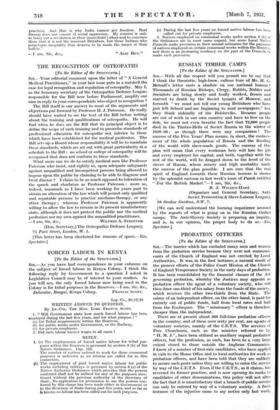FORCED LABOUR IN KENYA [To the Editor of the SPECTATOR.]
SIR,—As you have had correspondence in your columns on the subject of forced labour in Kenya Colony, I think the following reply by Government to a question I asked in Legislative Council may be of interest to your readers. As you will see, the only forced labour now being used in the Colony is for tribal purposes in the Reserves.—I am, Sir, &c., Delorcrine, Rongai, Kenya Colony. FRANCIS Scorr.
Leg. Co., 30/12/29
WRITTEN ANSWER TO QUESTION.
By LT.-Col.. TEE HON. LORD FRANCIS Scorr.
1. " Will Government state how much forced labour has been employed during the last five years, and for what purpose f " (e) for Tribal requirements within the Reserves,
(b) for public works under Government, or the Railway, (c) for private employers. 2. Did such labour receive wages in all cases I REPLY.
1. (a) The employments of forced native labour for tribal pur- poses within the Reserves is governed by section 8 (h) of the Native Ordinance. Cap. 129.
The number of natives ordered to work for these communal purposes is unknown as no returns are called for in this connection.
(b) The employment of paid forced native labour for public works including railways is governed by section 8 (o) of the Native Authority Ordinance which provides that the powers conferred shall not be utilised for any of the purposes men- tioned without the previous authority of the Secretary of State. No application for permission to use the powers con- ferred by this clause has been made either to Government or to the Secretary of State during past five years, and so far as is known no labour has been called out for such purposes. -(c) During the last five years no forced native labour has been called out for private employers.
2. Natives employed on communal works under section 8 (h) of the Ordinance are in most cases unpaid, but some Local Native Councils make provision in their annual estimates for the payment of natives employed on certain communal works within the Reserve, and there is an increasing tendency on the part of the Councils to make such provision.


























































 Previous page
Previous page